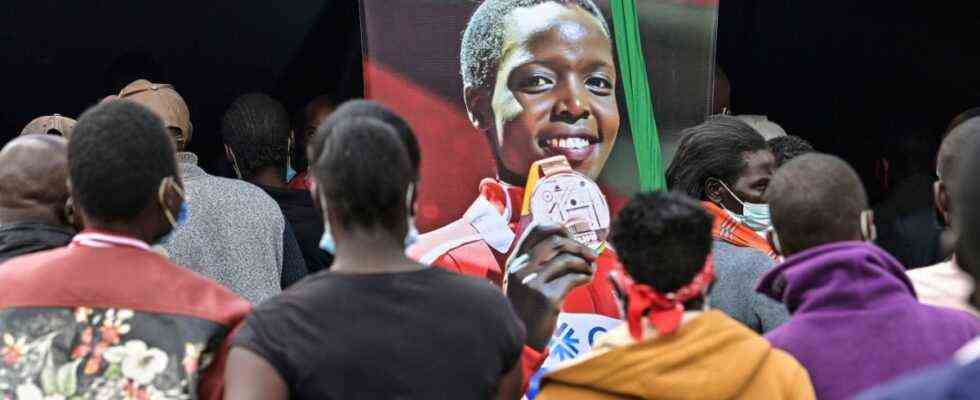Runner Agnes Tirop was buried last Saturday, the day she would have turned 26. Her last lap of honor was in the light of mourning, but despite all the sadness, it also looked like the celebration of a fulfilled, far too short life. Hundreds of relatives, friends and athletes, including the Kenyans Faith Kipyegon and Hellen Obiri and world record holder Joshua Cheptegei from Uganda, had gathered in a tent in the home of Tirop’s parents in Nandi province.
A choir sang, melancholy, but so briskly that the mourners rocked, some even danced. Videos can be seen how a line of people stood in line for the funeral feast in the midday sun, several hundred meters long. Running the series several times would have made a nice, sweaty training session.
Two terrible pieces of news have recently shaken global athletics: the alleged murder of the Ecuadorian Alex Quiñonez, the third place in the world championship over 200 meters, whose homeland Guayaquil has been torn apart by gang wars for weeks. And the alleged crime against the Kenyan Agnes Tirop. The 25-year-old was found lifeless in the middle of October in the bedroom of her apartment in Iten, the place high up in Kenya where so many running diamonds have already been cut.
In Tirop, the Kenya Athletics Association announced, one of the brightest jewels has been lost; an athlete who thought not only of her own success, but of that of her teammates, and who had already achieved so much: World Cup bronze over 10,000 meters in 2017 and 2019, fourth place most recently at the Olympic Games in Tokyo over 5000 meters. In September she even set the world record for 10 kilometers in road running (30:01 minutes) in Herzogenaurach, one month before her death.
She has now been stabbed and her husband has been in custody for a few days. And even if no proceedings have yet been opened, Tirop’s case has sparked a debate in Kenya about violence against women that extends far beyond sport and at the same time places it at the center of the protests.
Kenyan media recently reported that Tirop’s marriage was far more eventful than some confidants had realized. Others said Tirop told how her husband threatened to break her legs and kill her. At the beginning of October, Cynthia Makokha, a young soccer player, was brutally mistreated and murdered. The police also arrested her partner in the murder of the young athlete Edith Muthoni. The day before Tirop was buried in her homeland, a group of several hundred athletes pushed their way through Eldoret, on a poster it said: “End gender-based violence!”
Some Kenyans are calling for the death penalty to be reintroduced – women activists think little of it
Nancy Ikinu, the chairwoman of the Kenyan women’s rights movement “Fida Kenya”, announced in a statement that the incidents of violence against women in Kenya had recently risen again. She called on Kenya’s President Uhuru Kenyatta to classify such crimes as a national emergency in order to draw more resources and attention to the cases. Some Kenyans even wanted the death penalty to be reintroduced recently, but activists like Ikinu are critical of this. Rather, one must stop exposing victims of suspected violent crimes to public suspicion again, she said, and instead create a culture of togetherness in which suspects are identified. Or not become perpetrators in the first place.
Domestic violence is by no means a Kenyan problem, but it is still deeply rooted in the East African country’s society, which is strongly patriarchal in color. 45 percent of all Kenyans between the ages of 15 and 49 have experienced “physical violence” at some point, according to the government’s latest report. It dates from 2015. The perpetrators: mostly husbands or life partners. Human Rights Watch (HRW) recently reported that the number of unreported cases is presumably much higher. In any case, the situation worsened during the corona pandemic because curfews forced many families together for a long time.
Affected people described in an HRW report in Septemberthat they have been sexually assaulted, beaten, kicked out of the house or forcibly married. HRW criticized the country’s massive lack of protective facilities where women can find refuge. Many also did not dare to report their cases to the authorities, believing – often rightly – that they would not be helped, and if they did, only in return for bribes. Kenya’s government has recently initiated some reforms, according to the HRW report, but the researchers cast the political efforts into a gloomy conclusion: too little, too late.
Running jewel: Agnes Tirop had already collected a lot of merits at the age of almost 26 – here she won the 5000 meter run at the Diamond League meeting two years ago in Stockholm.
(Photo: Jonathan Nackstrand / AFP)
In African societies this has only gradually become a more familiar picture in recent years: that not only men lead their families into a better life by running, but women too. Tirop has borne many hopes – and bills – of the family, her father recently told the Kenyan media. The Danish Katrine W. Kjaer had only released a documentary last year (“Run like a girl”), which accompanies the runner Visiline Jepkesho, who wants to lift her family out of poverty.
The film showed compulsions and worries, but it also showed how hopefully the next generation and the next but one look up to runners like Jepkesho. In one scene, the athlete’s younger sister says: “I would probably have been married at this point in my life. Now I’m in school and hope that I can later be a teacher myself. By 2030 we women will rule Kenya , you’ll see! “
The death of Agnes Tirop is also a painful memory: how stony the road to get there is.

